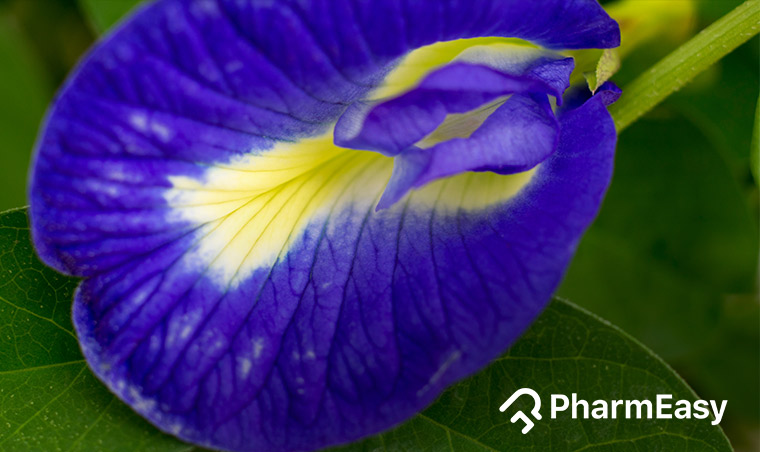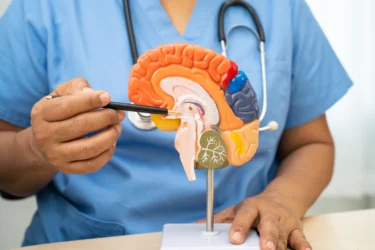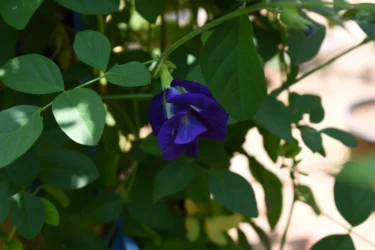Shankhpushpi: Benefits, Side Effects, Precautions & More!
By Dr Siddharth Gupta +2 more

Get,

to manage your symptom
Get your,


4 Cr+ families
benefitted

OTP sent to 9988776655



You’ve successfully subscribed to receive
doctor-approved tips on
Whatsapp

Get ready to feel your best.

Hi There,
Download the PharmEasy App now!!


Register to Avail the Offer
Send OTPBy continuing, you agree with our Privacy Policy and Terms and Conditions

Hi There,
Sign up on PharmEasy now!!
Trusted by 4 crore+ families

OTP sent to 9988776655



You have unlocked 25% off on medicines




Code: NU25
By Dr Siddharth Gupta +2 more
Table of Contents
Shankhpushpi is a plant native to India. It is scientifically called Convolvulus pluricaulis. Shakhpushpi is a Sanskrit word. This word basically means or stands for the plant with bell shaped or conch shaped flowers1,2. These flowers can be blue or white in color. In Ayurveda, it is recognized as ”Medhya Rasayana” which means a drug that rejuvenates, maintains and potentiates intellect and memory. This plant is used from its root to its tips and has a wide range of potential uses in man3.
In India, it is also known by various other vernacular names like:

The herb has diverse potential benefits for various systems of the body which are as follows1,4,5,6,7,8:

Shankhpushpi may have some benefits for brain:
Shankhpushpi may have nootropic potential i.e., it may have potential effect on memory, learning capacity and concentration in the person consuming it. It may be able to have some effect on conditions like attention deficit hyperactivity disorder (ADHD), which is usually seen in children, wherein the child has trouble paying attention, controlling impulsive behaviors or is overly active. However the studies available are insufficient to validate such claims and the exact effects on humans. You must consult a qualified doctor for proper advice and prescription.
Shankhpushpi may have neuroprotective potential, this indicates that it may have some beneficial effects on mental functions. Its antioxidant potential and anti-inflammatory potential may have possible benefit over brain functions like learning, thinking, reasoning, remembering, problem-solving, decision making, and attention. You must consult a qualified doctor for proper advice and guidance.
Due to its potential anti-depressant activity, shankhpushpi may be able to enhance the mood of the person consuming the herb. You must always take advise from a professional Ayurvedic doctor before consuming the plant preparations in depression-like conditions.

The herb shankhpushpi may have some effect on lowering blood pressure and is usually given to treat high blood pressure along with other herbal compounds. Various animal studies have revealed that its extracts lower Low-Density Lipoprotein-cholesterol (LDL-CH) which is the bad cholesterol, triglycerides (TG), and phospholipid levels. However, the studies on humans are insufficient to establish these benefits. Shankhpushpi may also be used in patients with high cholesterol due to its potential ability to lower cholesterol. Shankhpushpi may have the potential effect on these conditions. However, you must consult a qualified doctor for the mentioned conditions for proper prescription and detailed guidance.

The glycoprotein secretions of the herb may have shown some effect against various types of ulcers in the stomach. It may help in healing stomach ulcers. But we need further studies to establish these benefits.

It may make the skin glow. It may help with acne or pimples, which is usually very problematic in the teenage years of life. It may also help with skin infections. All these above potential uses are due to its anti-bacterial, antioxidant, and anti-inflammatory properties. You must consult a dermatologist for proper advice on skin conditions.
As is well-known with the brain-related effects of Shankhpushpi, it may also keep away the signs of ageing. Researchers think Shankshpushpi may be a natural anti-aging treatment. Antioxidants are thought to be abundant in it12.
Dr. Siddharth Gupta, B.A.M.S, M.D (Ayu)

The extract of shankhpushpi and compounds like tannins, saponins, coumarin, flavonoids, phenol and triterpenoids that are present in shankpushpi contribute to its activity against various bacteria.
Though studies show the benefits of shankhpushpi against various disease conditions, these studies are insufficient and there is a need for further studies to establish the true extent of the benefits of shankhpushpi on human health.
Did you know Shankhpushpi might be used for hair growth? Shankhpushpi oil is believed to reduce hair fall and enhance hair growth as a result of its rejuvenating nature13.
Dr. Rajeev Singh, BAMS
Shankhpushpi is available as a powder, tablet, capsule, juice, syrup and oil as well. Except for the oil that is massaged, rest all forms can be consumed with water or milk after meals preferably in the morning9.
You must consult a qualified doctor before taking shankhpushpi or any herbal supplements. Do not discontinue or replace an ongoing treatment of modern medicine with an ayurvedic/herbal preparation without consulting a qualified doctor.
Studies so far have not reported any major side effects of shankhpushpi. However, herbs react differently in different people and may have certain side effects and it should never be used for self-medication9,10. If you experience any discomfort, side effects or allergic reactions after using shankhpushpi, stop its use and contact your healthcare provider immediately.
Also Read: Medohar Guggulu: Uses, Benefits, Side Effects & More
Follow general precautions for any herb as per your doctor’s advice. Kindly do not self-medicate and do not substitute, alter or discontinue any ongoing treatment on your own. Other precautions to be followed are:
Also Read: Green Chilli: Uses, Benefits, Side Effects and More!
Mostly shankhpushpi is considered reasonably safe, but while using it the drugs mentioned below is to be avoided due to their interactions with the herb10.
Thus, patients taking blood pressure and seizure management medicines must consult their Ayurvedic physician before taking it. Moreover, Before consuming shankhpushpi for any health effects, talk to your doctor or physician about any precautions you might need to take. Consulting with your doctor will help you make better choices and avoid adverse health effects.
Also Read: Abhayarishta: Uses, Benefits & How to Use It
Ans: It has potential benefits in lowering blood sugar levels in diabetic patients. Various studies have been done to support this wherein on adding this herb to the patient on diabetic treatment the blood sugar reduction was higher6. However, these studies are insufficient to advise the exact effect on humans. Always consult a doctor for proper advice on serious conditions like diabetes.
There is no evidence currently available on which one is better than the other, but both may have potential as a memory enhancer and may be used either alone or in combination with other ingredients11.
Yes, they can be taken together; there are many syrups, capsules, and powders with the above combinations that are available in the market11.
The whole plant is used from top to bottom which includes the roots, stem and flowers of the plant9.
Yes, they are the same. Aparajita is another name for Shankhapushpi in the Hindi language1.
Disclaimer: The information provided here is for educational/awareness purposes only and is not intended to be a substitute for medical treatment by a healthcare professional and should not be relied upon to diagnose or treat any medical condition. The reader should consult a registered medical practitioner to determine the appropriateness of the information and before consuming any medication. PharmEasy does not provide any guarantee or warranty (express or implied) regarding the accuracy, adequacy, completeness, legality, reliability or usefulness of the information; and disclaims any liability arising thereof.
Links and product recommendations in the information provided here are advertisements of third-party products available on the website. PharmEasy does not make any representation on the accuracy or suitability of such products/services. Advertisements do not influence the editorial decisions or content. The information in this blog is subject to change without notice. The authors and administrators reserve the right to modify, add, or remove content without notification. It is your responsibility to review this disclaimer regularly for any changes.
Comments

Leave your comment...
You may also like
Comments